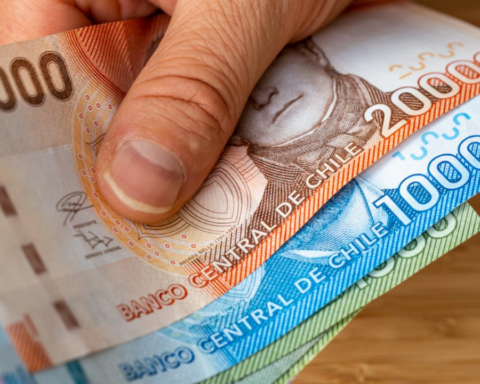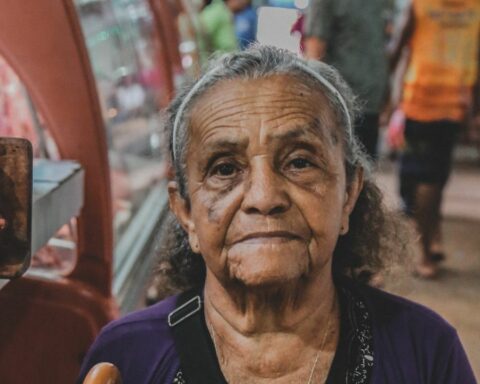The now Vice President of the Senate, Francisco Huenchumilla, in dialogue with The counter, He addressed the different dimensions of the political crisis that his party – the Christian Democrats (DC) – has faced over the past decade. In the parliamentarian’s opinion, “the DC has experienced a process of deterioration in recent years, as a result of the fact that we are no longer the great party of the 90s: today we are reduced to 5 deputies and 3 senators.”
A critical reality increased by the leak – which occurred in October 2022 – which included historical and important militants such as the governor of the Metropolitan Region (RM), Claudio Orrego, and the former minister in the governments of Patricio Aylwin and Michelle Bachelet, René Cortázar. All of this in the midst of internal tension due to the party’s decision to favor Approval in the past constituent plebiscite, deepening the severe fracture that has ended up exposing the struggle between those two irreconcilable and distant worlds. Two worlds that were headed by senators Yasna Provoste and Ximena Rincón, who until the latter left the party, functioned as “generals” completely at odds with each other.
In fact, there are those like Senator Matías Walker, who accuse Provoste of acting in an authoritarian manner, imposing terms, exercising a degree of power, which according to the parliamentarian believes, does not have any degree of counterweight within the party. In this regard, Huenchumilla, a natural ally of the former presidential candidate of the DC in the Senate, said that it is not good to “personalize political debates”, and specified that the fact that a single person can exercise a kind of authoritarian role is something that does not correspond to an objective vision.
In addition, the historical Falangist militant clarified the differences between his political vision and that of the Government, and tried to dispel doubts as to the role that should be fulfilled and the place where the DC should be positioned, from now on. “Today there is no bipolar thing between capitalism and a challenger, so the DC has to accept that today capitalism has triumphed in all parts of the world, and that what we are trying to do, in the face of neoliberalism and capitalism , is to have a Social and Democratic State of Law”, affirmed the parliamentarian for the Araucanía Region.
-What is your analysis of the internal political situation in the DC in recent years? What do you think should be, from now on, the “great challenge” that mobilizes the work of the party?
-The DC has experienced a process of deterioration in recent years, due to the fact that we are no longer the “great party” of the 90s: today we are reduced to 5 deputies and 3 senators. And also, today we face the challenge of modernizing its political program, its electoral programs, its internal organization, and its vision of how it is inserted in this changing world. I think that this process is an important challenge for the DC, in its search to overcome this critical situation that we have been experiencing in recent years, especially. Now it is time to ask if a party that is anchored in Christianity has something to say in this world. That is the great challenge that DC faces today: how to leap forward and position itself in the 21st century, in a world that is very different from the one that gave it its best triumphs, as was the case, for example, in the 1960s. and then with the return of democracy. That is the challenge that DC has, in my opinion.
– What do you think of that hypothesis that the internal coexistence of two strong sectors in the Falangism, between a group commanded by you together with Senator Provoste – with an ideology closer to the center-left, and even the ruling party – and another group? More tied to DC lore? Could that division have contributed to the internal crisis expressed in the recent flight of militants?
-In no party there is unanimity, I think that all parties have groups or subgroups that can have different views on many things. So, a political party by essence is a place for debating ideas and visions that are held in the country. Therefore, that does not attract my attention, the important thing is that the different visions and groups can have a common denominator, regarding first of all their ideology and the values they have, and the internal democratic method through which problems are resolved. . And therefore, if there is a minimum common denominator, that can be directed; but when there is a centrifugal force, where everyone wants to seize the party for their particular point of view – deteriorating internal democracy – this type of problem occurs.
I think that the DC did not have the virtue of being able to prosecute the differences that existed, and that is why this leak and everything we have witnessed in recent months occurred. And that is why I say that the DC has the challenge of standing up from all this crisis, making its proposal of ideas and internal reorganization transparent throughout the country.
-What do you think of Senator Walker’s statements in relation to the fact that the power of Yasna Provoste would not have a “counterweight” within the DC? What level of control and influence does the former presidential candidate have in the internal Falangist?
-I think that it is not good to personalize political debates, because if you look at DC from the 90s forward, you could name between 10 and 15 people who always had a great influence on the party, including the Walker family. So, to say that now a single person (Yasna Provoste) exercises a kind of authoritarian role, it seems to me that it does not correspond to an objective vision, because the DC has had great leaders and very influential people – some more than others – and Therefore, this type of leadership will always exist.
I do not believe that the senator (Provoste) is responsible for the crisis that the party has had and for the fact that some people have emigrated from the party. Those who left the party did so because, fundamentally, they are people more inclined to the center right, than to the traditional political vision that the party has had. So, I believe that this is typical of an internal debate, and what the DC has to do is to modernize and have a party organization and a vision about the problems of society and the economy, in accordance with the reality of the 21st century.
-In your opinion, could the media explosion of the conflict or confrontation between senators Yasna Provoste and Ximena Rincón contribute to the increase in said internal crisis? Could this situation have been handled better?
-It is that the parties have to have mechanisms to process the differences that may exist, and of all kinds, between prominent militants. And I think that the DC has an organization that is left in the past, and that it must be modernized, because a party organization is key for a party to function well, with participatory and deliberative militants, who have political training and who participate in debates. This is key for internal democracy to function properly, and in this way to process the differences. If this is not the case, party identity breaks down and each party goes their own way, and that brings with it the crises we are experiencing. It is the same thing that happens in the Chamber of Deputies or the Senate, which have to have mechanisms to process differences and make decisions. So, when political parties fragment, it is very difficult to process and make those decisions.
-And correct differences for what? What is the next step for a party in obvious transit?
-I think that the DC was born as a political alternative, in a world scenario in which the fight was between capitalism and communism. That fight ended with the fall of real socialism and globalization, but the great triumphs of the DC were in the government of Eduardo Frei Montalva, in a polarized world. A polarization that brought many misfortunes in the world and that in Chile ended, unfortunately, with the coup d’état of 1973. But when we recovered democracy we were in a different world. Today there is no bipolar thing between capitalism and a challenger, so the DC has to accept that today capitalism has triumphed in all parts of the world, and that what we are trying to do, in the face of neoliberalism and capitalism, is to have a Social and Democratic State of Law.
-And if they share said matrix idea of the ideological discourse of the Government? So how are they different?
-The alternative that we promote involves accepting the market economy, but not accepting the market in social issues such as health, education, pensions, or the environment, among others. So, under this logic, small and medium-sized companies must be part of the DC, and for that it is necessary that we are not afraid of entrepreneurship and the participation of the private sector in the economy. So, it is a different world that we have not yet accepted, and that I think we have to accept.
-What is your vision of the Government and its challenges ahead? How should the Executive face this, his second year in office?
-Today we have a government headed by a new generation of politicians, to whom the country handed over the leadership of the State, and that experience began with great enthusiasm, but later it landed drastically, because they realized that apart from energy of the renewal experience is required. So, faced with this, the old method of democracy is repeated, which is conversation, dialogue and the search for agreements. Because what we are after is to advance, but at the same time to have political stability, avoiding having great frustrations. But we seek political stability to achieve economic development and have social peace, which are the great objectives that every government should have, and that the opposition should also have, because beyond having different opinions, they understand that we are living in a democracy, and living in a democracy it supposes that.
-You were one of the promoters of the DC’s support for Approval in the failed constituent process. From now on, how do you face this new process? What are your expectations?
They are different processes. In this second process, I believe that we are all interested – not only the DC but also the political world as a whole – in that this works well and that we can all be in favor of the Approval, because if we divide again, then it will mean that this process it will not be well managed, which would be bad for the functioning of democracy.
-Do you feel that the government and the center-left are under pressure to end this process once and for all, because it is also part of their own political agenda and their own electoral commitments?
-I do not see this as something conjunctural of the Government. I believe that this constituent process is a matter that is the responsibility of the country as a whole, both the pro-government and opposition parties, and Chile as a whole, because what it is about is that people feel that in the midst of all these turns that we have given, the product is something that has legitimacy, and that advances the doubts left by the 1980 Constitution and the failed process of September 4. So, beyond the merely academic that this process may mean with the participation of experts and a series of safeguards that have been taken, the great challenge of this Constituent Council and this new process is to present to the citizens something that is good. and that responds to their main doubts and demands.
Because if we have a Constitution that goes to the other side, that is “catoparde”, and therefore, no one is changed and it is simply a retouching, then we are concealing the possibility -underground- that the problems remain there and in at some point this will come up again. So, for this reason, I believe that this goes beyond the programmatic interest of the Government and what the opposition may want, it is the country that needs to close this process once and for all, especially this year, when we are commemorating 50 years of the coup. of State. The idea is that with this new constituent process we close a chapter and take a leap forward with the rules of the game that are legitimized and accepted by the people.








